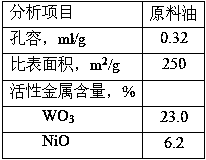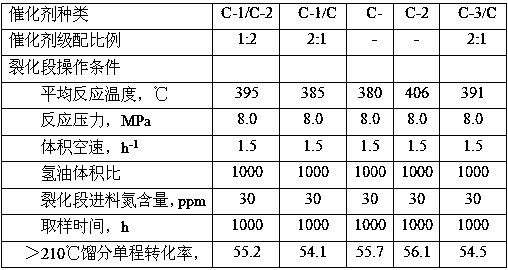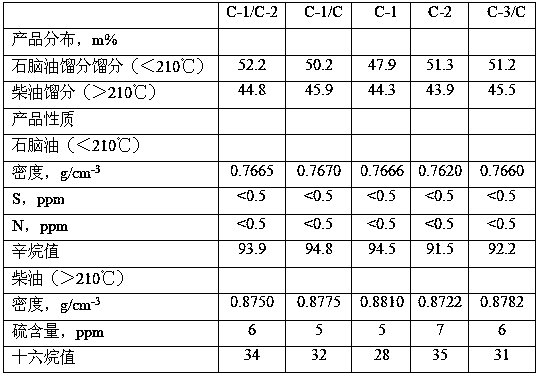A Catalytic Diesel Hydrogenation Conversion Process
A technology of hydrogenation conversion and catalytic diesel oil, which is applied in the fields of hydrotreatment process, petroleum industry, molecular sieve catalyst, etc. It can solve the problem of unfavorable hydrogenation conversion to produce high-octane gasoline, large octane loss of gasoline products, and lower gasoline composition. Hydrogenation saturation and other problems, to meet the high nitrogen tolerance and high reactivity, avoid excessive secondary cracking, reduce the effect of secondary cracking
- Summary
- Abstract
- Description
- Claims
- Application Information
AI Technical Summary
Problems solved by technology
Method used
Image
Examples
Embodiment 1
[0030] Preparation method and physical and chemical properties of molecular sieve 1:
[0031] (1) Take 200g of NaY molecular sieve raw powder prepared in the laboratory, mix it with ammonium nitrate with a concentration of 1.5mol / L according to the liquid-solid ratio of 4:1, exchange at 80°C for 2 hours, repeat this process twice, and the exchanged Y molecular sieve Na content in Na 2 O is calculated as 2.5%;
[0032] (2) Hydrothermally treat the Y molecular sieve obtained in step (1) at 560°C and 0.1MPa for 2 hours;
[0033] (3) The molecular sieve obtained in step (2) was stirred and mixed with distilled water according to the liquid-solid ratio of 5:1, and then the temperature was raised to 75°C. During the stirring process, 400ml of 0.6mol / L aluminum sulfate solution was added, and the reaction was carried out at constant temperature for 2 hours.
[0034] (4) First dry the molecular sieve obtained in step (3) at 120°C for 3 hours, then soak the molecular sieve obtained i...
Embodiment 2
[0039] Molecular sieve 2 modification process:
[0040] (1) Take 200g of NaY molecular sieve raw powder prepared in the laboratory, mix it with ammonium nitrate with a concentration of 0.6mol / L according to the liquid-solid ratio of 3:1, exchange at 80°C for 3 hours, repeat this process 3 times, and the exchanged Y molecular sieve Na content in Na 2 O is calculated as 2.0%;
[0041] (2) Hydrothermally treat the Y molecular sieve obtained in step (1) at 530°C and 0.1Mpa for 2 hours;
[0042] (3) Step (2) sieve the oxalic acid solution (concentration in H + Total) 400ml mixed, then heated up to 50°C, and reacted at constant temperature for 2 hours;
[0043] (4) The molecular sieve obtained in step (3) was stirred and mixed with distilled water according to the liquid-solid ratio of 5:1, and then the temperature was raised to 80°C. During the stirring process, 400ml of 0.5mol / L aluminum sulfate solution was added, and the reaction was carried out at constant temperature for 2 ...
Embodiment 3
[0051] Preparation method and physical and chemical properties of molecular sieve 3:
[0052] The Y molecular sieve is modified by conventional methods, that is, the NaY molecular sieve is first ammonium-exchanged to Na 2 The O content is 2.0%, and then mixed with 0.10mol / L ammonium fluorosilicate solution according to the liquid-solid ratio of 10:1 and heated to 80°C, then reacted at constant temperature for 2 hours. After being treated with ammonium fluorosilicate, the sample was filtered and washed at 0.1 Molecular sieve 3 was obtained by hydrothermal treatment at Mpa and 540° C. for 2 h. Molecular sieve 3 has a silicon to aluminum ratio of 15.0. XRD analysis results show that its unit cell constant is 2.442 and its relative crystallinity is 92%. The pore volume is 0.36ml / g, and the infrared acid content determined by infrared analysis is 0.93mmol / g.
PUM
| Property | Measurement | Unit |
|---|---|---|
| specific surface area | aaaaa | aaaaa |
| density | aaaaa | aaaaa |
| dry point | aaaaa | aaaaa |
Abstract
Description
Claims
Application Information
 Login to View More
Login to View More - R&D
- Intellectual Property
- Life Sciences
- Materials
- Tech Scout
- Unparalleled Data Quality
- Higher Quality Content
- 60% Fewer Hallucinations
Browse by: Latest US Patents, China's latest patents, Technical Efficacy Thesaurus, Application Domain, Technology Topic, Popular Technical Reports.
© 2025 PatSnap. All rights reserved.Legal|Privacy policy|Modern Slavery Act Transparency Statement|Sitemap|About US| Contact US: help@patsnap.com



